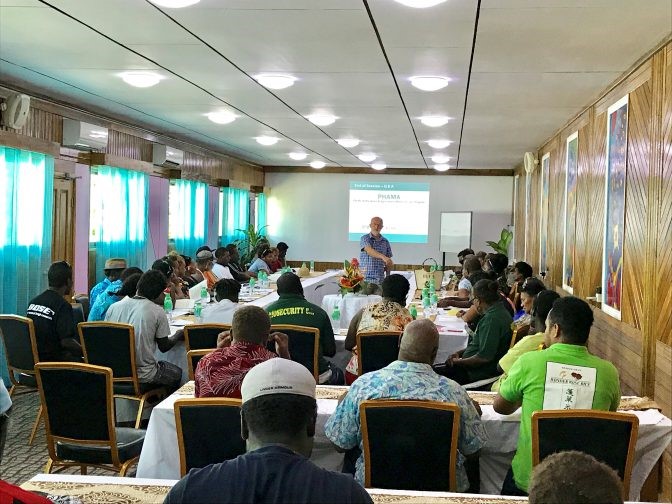Awareness training sessions for stakeholders of the handicrafts and tourism industries in the Solomon Islands have been well received and lauded as an “eye-opening” experience.
Organised by the Australian and New Zealand-funded Pacific Horticultural and Agricultural Market Access (PHAMA) Program, the training was well attended by about 150 stakeholders including handicrafts vendors, tourism operators, women’s groups, non-government organization representatives and donor partners. Officials from the Biosecurity Division of Ministry of Agriculture and Livestock, Ministry of Culture and Tourism, and the Solomon Islands Visitors Bureau also attended.

Rob Duthie and Patrick Duthie of Kalang carried out the trainings in Honiara and Gizo in Western Province. The events complemented the handicraft video and vendor guide that have been developed by PHAMA to create awareness of biosecurity requirements for exporting handicrafts.
Narety Bulehite, a Biosecurity Solomon Islands Officer based in Gizo, said the training was important for her own understanding in being able to deal with handicrafts quarantine issues and enquiries from producers and tourists.
Rendy Solomon, President of Western Province Council of Women, encouraged handicraft stakeholders to take a collaborative approach as a way forward for the industry. She said the training was the first of its kind and extended her appreciation to PHAMA for the initiative.
Stone carver, Aqiri Golo, said, “This is an eye-opener for me. My people and I had no previous knowledge of what happens to our products after tourists buy them and the quarantine issues that apply.” He described the training and the vendor guide as mind-opening and invaluable. “We need more training and copies of the vendor guide to be distributed to other handicraft producers.”
Handicrafts are an important trade in the country. Many handicrafts are produced specifically for sale to tourists, and cruise ship-based tourism is of growing importance as a potential handicraft market, particularly as vessels increase their visitation to outer island destinations where villages have few income-earning opportunities. Carnival Cruises, the main operator in the region, expect further growth in the number of sailings and is initiating sailing routes to other locations in Solomon Islands.

A limiting factor in the sale of handicrafts is cautious buying behavior by tourists uncertain of the quarantine status of products. This is compounded by a lack of readily available and easily interpretable information on what can and cannot be easily exported to Australia and New Zealand, the main source markets for Pacific tourism, particularly for cruise ships. These issues have been confirmed by recent passenger surveys of cruise ships to Melanesian countries.
PHAMA developed a video and vendor guide document for Solomon Islands. These contain awareness information relating to the biosecurity aspects of handicraft trade – explaining the relevant quarantine concerns, potential risks and in some cases, basic mitigation measures that can be taken. They also contain examples of handicrafts, potential issues and key messages on import requirements. In general, the materials will help to increase awareness of these market requirements and strengthen this important local industry.
-ENDs-
For further information, contact PHAMA Plus – Team Leader, Andrew Piper at a.piper@phamaplus.com.au
